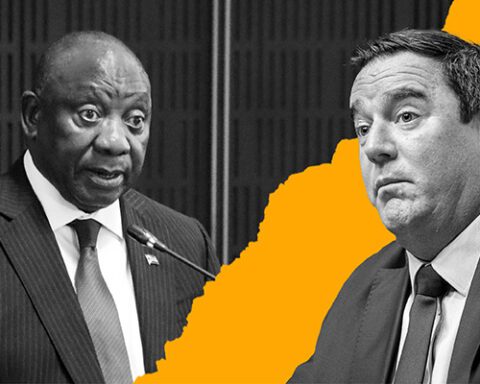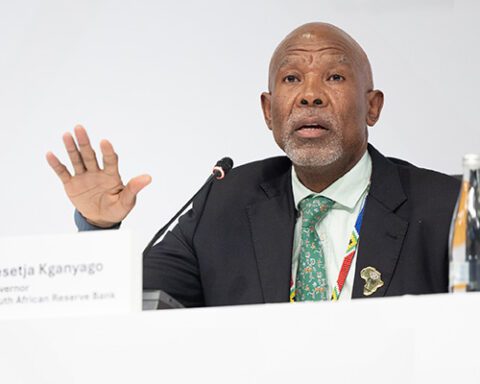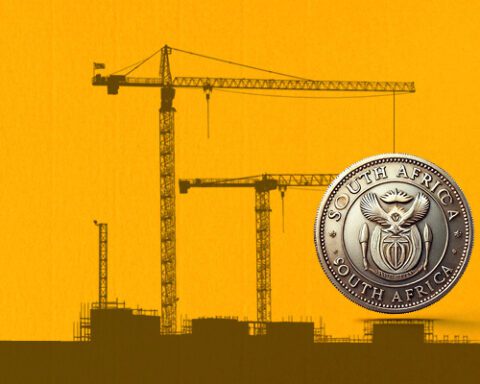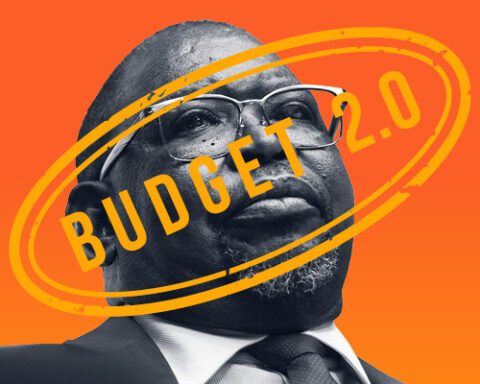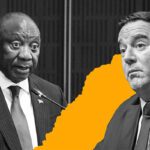It’s a well-worn truism that insanity is doing the same thing over and over, expecting a different result. That may sum up Enoch Godongwana’s second stab at a budget – another stale response to South Africa’s deepening woes.
Yet the 65-year-old finance minister described his and National Treasury’s work to parliament on Wednesday as a “bold and pragmatic approach” to achieving faster, more inclusive economic growth.
For ETM Analytics head George Glynos, National Treasury’s latest effort “is like trying to convince Putin that he needs to adopt a constitutional democracy”.
Godongwana – who had three weeks to tinker with the budget after his first attempt was rejected for trying to sneak through a two percentage point VAT hike – spoke of the need to confront “difficult choices” to reduce debt and make government finances more sustainable.
“Not all that much has changed from the original budget,” says Glynos. “It’s an exercise in futility to be pushing down this well-trodden road where we are somehow expecting a different economic reaction to what is essentially a tweak to pre-existing budget lines. I don’t see the point.”
But, warns Glynos, with South Africa spending almost 22c in every rand on its debt-servicing costs, “we are at a tipping point and we need to be doing something dramatically different to get a different outcome”.
Godongwana also mentioned fixing rail, ports, power and water infrastructure — without a hint of irony that the ANC has spent the past 30 years mismanaging, dismantling and corrupting the very institutions meant to deliver them.
And while the ANC pledged to cut the budget deficit in all the years it was in the majority, it repeatedly failed to rein in the budget deficit, Glynos said.
The one percentage point VAT increase over two years is not going to change that reality. “You have to be aggressive in your reforms and do things that meaningfully move the dial in terms of attracting foreign capital,” he adds, sounding as exasperated as you might expect.
“Make a concerted effort not just to rid the state of the burden of these SOEs but impose some competitiveness in these network industries and allow the private sector to fight it out,” he urges. “I’m not saying privatisation is the silver bullet to fight all ills, but, man, it’s got be better than what we have right now.”
‘A short-term fix’
For Thomas Lobban, a director at Ibex Consulting, a division of Latita Africa, “what has come as a shock” is the decision to keep personal income tax brackets unchanged for the second consecutive year.
“With no adjustments for inflation, individual taxpayers will effectively pay more tax in real terms, leading to diminished purchasing power across the board,” he says.
What’s more, a proposal to tax previously exempt foreign pension income “is set to hit expatriates and returning retirees hard”, Lobban adds. “These measures raise serious concerns about fairness and economic impact, with little upside benefit foreseen.”
Andrew Bahlmann, chief executive of corporate and advisory at Deal Leaders International, describes the budget as a “short-term fix” that offers little for companies to get excited about. While corporate tax rates weren’t raised, he notes that the tax burden on businesses as a share of GDP still places South Africa 13th out of 123 countries – a ranking that continues to deter foreign direct investment.
While the government plans to offset the negative effect of the VAT increase on the poor by increasing the number of zero-VAT-rated goods, the hike in 2018 had limited success, says Ronald King, head of public policy and regulatory affairs at PSG Wealth. This is mainly because, by the Treasury’s own admission, suppliers didn’t pass the relief onto consumers by sufficiently lowering prices.
“The generation of VAT revenue is also dependent on the level of spending by households, companies and [the] government, whose spending is dependent on current and expected levels of economic growth,” he says. “If economic growth is weaker than expected, spending behaviour will be adjusted, and the growth in VAT revenue is likely to falter.”
Some positives
Yet Ninety One portfolio manager Adam Furlan is a little more upbeat about the budget – and the politics around it.
“Our expectations weren’t for that significant a change going into the second budget and that’s mainly because there wasn’t enough time for them to really rework anything in the three weeks they had,” he tells Currency .
But, he says, “a very big positive” is the fact that “they want fiscal consolidation now. And that tells me that we aren’t going to get debt metrics spiralling out of control from here”.
Furlan also sees pro-growth aspects in the additional R47bn allocated to infrastructure over the next three years.
These positives were reflected in the bond market, where long bond yields (bonds which have a duration of 20 to 30 years) have flattened. This is the “yield curve” that is more sensitive to the credit risk premium of the country, says Furlan.
“The main thing we really have learnt here is that the GNU [government of national unity] is willing to compromise – the ANC didn’t force this through and go to other parties to make this happen,” he says.
“Secondly, they’ve shown us they aren’t going to borrow more to fund frontline expenditure.”
Still, the question remains whether Treasury could change its budget to deliver growth rates of above 3% – which is President Cyril Ramaphosa’s target.
Not really, argues Furlan.
“We’ve seen the benefit of cheaper data through spectrum enhancements and in electricity and energy we’ve seen better outcomes in terms of load-shedding. Port and rail are the major constraints and the focus now, [but] there is not much that Treasury can actually do in a budget to force that reform to happen. They need to support infrastructure investment, which they’re doing, but ultimately it has to come from reforms.”
Parliament now has 16 days to pass the budget – in which it will go to the finance committee and come back to the house for voting.
Sign up to Currency’s weekly newsletters to receive your own bulletin of weekday news and weekend treats. Register here.

